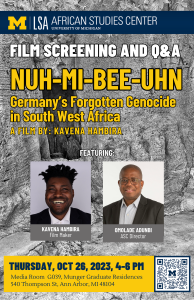Presented By: African Studies Center
ASC Film Screening. Germany’s Forgotten Genocide in South West Africa: Nuh-Mi-Bee-Uhn, followed by a discussion with Film Director Kavena Hambira
Kavena Hambira, California State University Stanislaus; and Omolade Adunbi, ASC Director and Professor, Afroamerican and African Studies

Germany’s Forgotten Genocide in South West Africa: Nuh-Mi-Bee-Uhn was directed by Kavena Hambira. The film “focuses on the twentieth century’s first genocide—the Herero and Nama Genocide, carried out by Germany in 1905 in his family’s native Namibia. Hambira bridges geography and time to describe the indelible and far-reaching impacts of the genocide and the ongoing struggle for reparations and reconciliation.” The film will be accompanied by a discussion with Hambira and ASC Director Omolade Adunbi.
Kavena Hambira, MFA (he/ him) – With his work grounded in documentary filmmaking, Hambira seeks to connect nodes of history that tell a story of shared resilience and invention despite ongoing colonial and racial oppression. While his earlier work documented families impacted by police violence, his current work focuses on the twentieth century’s first genocide—the Herero and Nama Genocide, carried out by Germany in 1905 in his family’s native Namibia.
Engaging textiles and traditional costumes alongside documentary film, here Hambira bridged geography and time to describe the indelible and far-reaching impacts of the genocide and the ongoing struggle for reparations and reconciliation. Kavena holds a master’s in fine art (MFA) from the University of California, Berkeley, and is currently an adjunct faculty at California State University Stanislaus.
Omolade Adunbi is a political and environmental anthropologist and professor of Afroamerican and African Studies in the Department of Afroamerican and African Studies (DAAS). His research examines the dynamics of power, natural resource extractive practices, governance, human and environmental rights, culture, transnational institutions, multinational corporations, and the postcolonial state.
Kavena Hambira, MFA (he/ him) – With his work grounded in documentary filmmaking, Hambira seeks to connect nodes of history that tell a story of shared resilience and invention despite ongoing colonial and racial oppression. While his earlier work documented families impacted by police violence, his current work focuses on the twentieth century’s first genocide—the Herero and Nama Genocide, carried out by Germany in 1905 in his family’s native Namibia.
Engaging textiles and traditional costumes alongside documentary film, here Hambira bridged geography and time to describe the indelible and far-reaching impacts of the genocide and the ongoing struggle for reparations and reconciliation. Kavena holds a master’s in fine art (MFA) from the University of California, Berkeley, and is currently an adjunct faculty at California State University Stanislaus.
Omolade Adunbi is a political and environmental anthropologist and professor of Afroamerican and African Studies in the Department of Afroamerican and African Studies (DAAS). His research examines the dynamics of power, natural resource extractive practices, governance, human and environmental rights, culture, transnational institutions, multinational corporations, and the postcolonial state.